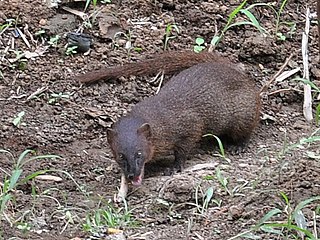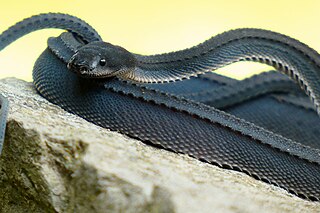
The lesser adjutant is a large wading bird in the stork family Ciconiidae. Like other members of its genus, it has a bare neck and head. It is however more closely associated with wetland habitats where it is solitary and is less likely to scavenge than the related greater adjutant. It is a widespread species found from India through Southeast Asia to Java.

The banteng, also known as tembadau, is a species of cattle found in Southeast Asia, and Australia. The head-and-body length is between 1.9 and 3.68 m. Wild banteng are typically larger and heavier than their domesticated counterparts, but are otherwise similar in appearance. The banteng shows extensive sexual dimorphism; adult bulls are generally dark brown to black, larger and more sturdily built than adult cows, which are thinner and usually pale brown or chestnut red. There is a big white patch on the rump. Horns are present on both sexes, and are typically 60 to 95 cm long. Three subspecies are generally recognised.

The Javan myna, also known as the white-vented myna, is a species of myna. It is a member of the starling family. It is native to Bali and Java. It has been introduced to other Asian countries, and as far away as Puerto Rico.

The Javan mongoose is a mongoose species native to Southeast Asia.
The Java pipistrelle is a species of pipistrelle bat found in South and Southeast Asia, including Afghanistan, Bangladesh, Brunei, Cambodia, China, India, Indonesia, Laos, Malaysia, Myanmar, Nepal, Pakistan, Philippines,Singapore, Thailand, and Vietnam. It favors human habitations. A 2010 research paper from the Philippines regarding the prevalence of coronaviruses in bats tested several Java pipistrelle bats.

The Java mouse-deer is a species of even-toed ungulate in the family Tragulidae. When it reaches maturity it is about the size of a rabbit, making it the smallest living ungulate. It is found in forests in Java and perhaps Bali, although sightings there have not been verified.

Tragulus is a genus of even-toed ungulates in the family Tragulidae that are known as mouse-deer. In Ancient Greek τράγος (tragos) means a male goat, while the Latin diminutive –ulus means 'tiny'. With a weight of 0.7–8.0 kg (1.5–17.6 lb) and a length of 40–75 cm (16–30 in), they are the smallest ungulates in the world, though the largest species of mouse-deer surpass some species of Neotragus antelopes in size. The mouse-deer are restricted to Southeast Asia from far southern China to the Philippines (Balabac) and Java. Following recent taxonomic changes, several of the species in this genus are poorly known, but all are believed to be mainly nocturnal and feed on leaves, fruits, grasses, and other vegetation in the dense forest undergrowth. They are solitary or live in pairs, and the males have elongated canine teeth that are used in fights. Unlike other members of their family, the Tragulus mouse-deer lack obvious pale stripes/spots on their upper parts.

Xenodermus javanicus, also known as the Dragon Snake, Javan Tubercle Snake, Javan Mudsnake, or Rough-backed Litter Snake, is a small non-venomous, semi-fossorial Colubrid snake belonging to the monotypic genus Xenodermus. This species is best known for their characteristic dorsal scales and interesting defense mechanism in which they stiffen their entire bodies when threatened. X. javanicus is nocturnal and subsists on a diet of frogs, tadpoles and small fish. While they are known to perish once placed into captivity, some herpetoculturists have been successful in keeping them.

Acrochordus javanicus, commonly known as the elephant trunk snake or the Javan file snake, is a species of snake in the family Acrochordidae, a family which represents a group of primitive non-venomous aquatic snakes. The species is also kept as an exotic pet.
Gyaritus is a genus of longhorn beetles of the subfamily Lamiinae, containing the following species:
Gyaritus affinis is a species of beetle in the family Cerambycidae. It was described by Stephan von Breuning in 1938.
Gyaritus gahani is a species of beetle in the family Cerambycidae. It was described by Stephan von Breuning in 1938.
Gyaritus malaccensis is a species of beetle in the family Cerambycidae. It was described by Stephan von Breuning in 1938.
Gyaritus siamensis is a species of beetle in the family Cerambycidae. It was described by Stephan von Breuning in 1950.
Gyaritus spinosus is a species of beetle in the family Cerambycidae. It was described by Stephan von Breuning in 1939. It is known from Borneo.
Gyaritus varius is a species of beetle in the family Cerambycidae. It was described by Francis Polkinghorne Pascoe in 1864. It is known from Borneo and Malaysia.
Gyaritus fulvopictus is a species of beetle in the family Cerambycidae. It was described by Francis Polkinghorne Pascoe in 1864. It is known from Borneo.
Gyaritus viduus is a species of beetle in the family Cerambycidae. It was described by Francis Polkinghorne Pascoe in 1886. It is known from Borneo and Malaysia.
Gyaritus quadridentatus is a species of beetle in the family Cerambycidae. It was described by Maurice Pic in 1936. It is known from Vietnam.
Gyaritus lungtauensis is a species of beetle in the family Cerambycidae. It was described by Gressitt in 1951. It is known from China.







